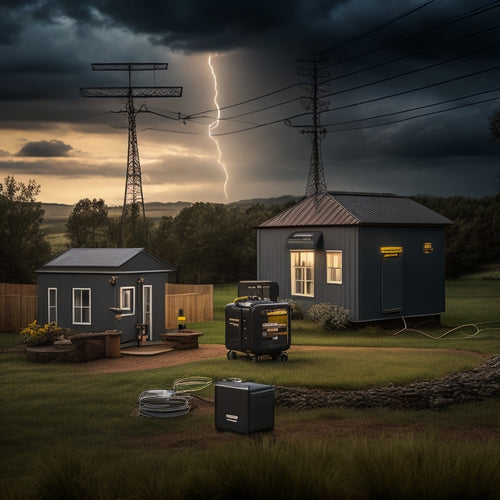
Installing Solar Panels on House
Share
By installing solar panels on your house, you'll reveal a multitude of benefits, from slashing your energy bills to enhancing your property value, all while doing your part for the environment. You'll generate electricity on-site, reducing your reliance on the grid and potentially achieving zero energy bills. You'll also increase your property value, making your home more attractive to eco-friendly buyers and potentially increasing its selling price. With advanced solar panel technologies and government incentives, you'll be able to enjoy significant savings and a more sustainable lifestyle - and that's just the beginning of your solar expedition.
The Essentials
- Installing solar panels on your house can significantly reduce your energy bills and potentially achieve zero energy bills through energy independence.
- Solar panels increase your property value, potentially increasing the selling price by up to 17%, and attract more buyers who prioritize energy efficiency.
- A roof assessment is crucial before installation, considering factors like shading patterns, roof obstructions, and orientation to optimize solar panel performance.
- Efficient energy conversion cells, such as bifacial cells and perovskite cells, can boost solar panel efficiency and enhance system performance.
- The US government offers significant incentives for solar energy adoption, including a federal tax credit of up to 26% of solar installation costs.
Zero Energy Bills Await
You'll greatly reduce your energy consumption by utilizing the power of the sun, which directly translates to lower monthly costs.
With solar panels, you'll be generating electricity on-site, reducing your reliance on the grid and slashing your energy bills. By doing so, you'll be on your way to enjoying zero energy bills, a considerable financial advantage that'll benefit your wallet and the environment.
Additionally, with an all-encompassing solar power system for your house, you can eliminate the worry of rising electricity bills and contribute to a cleaner, more sustainable future.
Reduced Energy Consumption
With a solar panel installation, nearly 75% of your energy needs can be met directly from the sun, drastically reducing your reliance on the grid.
By investing in solar power, you'll not only reduce your energy bills but also embrace a cleaner future and take control of your energy needs. This shift towards energy efficiency means you'll be using less power from the utility company, making you more self-sufficient and closer to achieving sustainable living.
You'll notice a significant decrease in your energy consumption, as the solar panels will provide most of the power you need.
This reduction in energy usage won't only benefit the environment but also give you a sense of independence from the grid. You'll be utilizing the clean, renewable energy from the sun to power your home, reducing your carbon footprint and contributing to a cleaner, healthier planet.
Lower Monthly Costs
The cost savings of solar panels are undeniable, and one of the most notable advantages is the drastic reduction in your monthly energy bills. By generating your own clean energy, you'll considerably lower your reliance on the grid, resulting in substantial long-term savings.
With solar panels, you'll enjoy energy independence, freeing yourself from the volatility of energy prices. In addition, a solar panel system also tackles the environmental impact of fossil fuels, providing a sustainable and eco-friendly alternative that greatly reduces carbon emissions.
Additionally, it mitigates the uncertainty of energy price fluctuations, offering a reliable and long-term solution that protects you from volatile electricity rates. As you produce your own energy, you'll be shielded from rate hikes and seasonal fluctuations.
Your solar panels will generate electricity during the day, powering your home and reducing your energy consumption from the grid. This means you'll see a considerable drop in your monthly bills, potentially saving hundreds or even thousands of dollars per year.
The more energy you produce, the less you'll need to purchase from your utility company, resulting in lower monthly costs. With solar panels, you'll be on your way to achieving zero energy bills, enjoying the freedom and security that comes with generating your own clean energy.
Increases Property Value
By installing solar panels, you'll not only reduce your energy bills but also increase your property's value.
In fact, studies have shown that solar panels can enhance your selling price by up to 17%, making your home more attractive to potential buyers.
As you make the switch to renewable energy, you'll be joining the growing trend of homeowners who are opting for energy efficiency and reducing their carbon footprint.
Additionally, solar panels add a touch of luxury appeal, setting your property apart from others in the neighborhood.
Boosts Selling Price
Installing solar panels can greatly enhance your property's selling price, an essential consideration for homeowners looking to cash in on their investment. This is especially true in today's solar market trends, where eco-friendly features are highly valued by homebuyers.
In fact, studies have shown that solar panels can increase your property's value by up to 17%, making them a smart investment for anyone looking to sell their home in the future.
With regard to homebuyer preferences, energy efficiency is at the top of the list. Potential buyers are willing to pay a premium for homes with solar panels, as they provide a clear benefit in terms of reduced energy costs and a lower carbon footprint.
By installing solar panels, you can attract more buyers and drive up demand for your property, ultimately leading to a higher selling price. Additionally, solar panels can also help your property stand out in a competitive market, giving you a competitive edge over other sellers.
Adds Luxury Appeal
You're not just investing in a sustainable energy solution when you install solar panels - you're also elevating your property's luxury appeal.
Solar panels seamlessly integrate into modern design, adding a sleek, high-tech element to your home's exterior. The clean lines and minimalist aesthetic of solar panels complement contemporary design, making your property stand out from the crowd.
As a result, your home's curb appeal increases, attracting potential buyers who value luxury aesthetics and eco-friendliness.
Efficient Energy Conversion Cells
You'll want to focus on cell efficiency enhancers that optimize photon absorption and reduce thermal losses, ensuring maximum energy conversion.
By utilizing advanced technologies in renewable energy systems, you can greatly increase your energy independence and reduce your electricity bills sustainable power systems.
High-power conversion rates are also essential, as they directly impact the overall performance of your solar panel system.
Cell Efficiency Boosters
High-efficiency photovoltaic cells are the backbone of a productive solar panel system, and cell efficiency enhancers play an essential role in maximizing their energy conversion capabilities. These enhancers improve cell performance, resulting in increased energy yield and reduced energy costs. As you consider installing solar panels, understanding the different types of cell efficiency amplifiers can help you make an informed decision.
| Cell Efficiency Amplifier | Description |
|---|---|
| Anti-Reflective Coatings | Reduce reflection and increase light absorption, enhancing energy yield by up to 5% |
| Bifacial Cells | Capture energy from both sides of the panel, increasing energy yield by up to 25% |
| Perovskite Cells | Offer higher power conversion efficiency rates than traditional silicon cells |
| Concentrated Photovoltaic (CPV) Cells | Use mirrors or lenses to focus sunlight, increasing energy yield by up to 41% |
| Thermophotonic Cells | Convert heat into electrical energy, increasing overall system efficiency |
High-Power Conversion Rates
Utilizing maximum energy from the sun's rays is essential for a solar panel system's overall performance, and efficient energy conversion cells play an important role in achieving this goal.
These cells, also known as high-power conversion rate cells, are a vital component of your solar technology. They're responsible for converting sunlight into electrical energy, making them a significant factor in your path towards energy independence.
When it comes to high-power conversion rates, you'll want to look for cells with a high fill factor. This measures how efficiently the cell converts sunlight into usable energy. A higher fill factor means more energy is being captured from the sun's rays, resulting in a more efficient solar panel system.
Additionally, consider cells with a high open-circuit voltage, as this directly affects the system's overall power output. By choosing cells with high-power conversion rates, you'll be able to maximize your energy production, reduce your reliance on the grid, and take a significant step towards true energy independence.
Assess Your Roof's Shading
You'll need to identify any roof obstructions, such as vents, skylights, or chimneys, that could cast shadows on your solar panels, as well as nearby trees that may block sunlight.
Considering the significance of renewable energy systems, it's vital to assess the impact of shading on your solar panel's performance.
It's also essential to analyze shading patterns over time, considering the sun's position at different times of day and year.
Roof Obstructions and Trees
Evaluate your roof's shading by identifying obstructions that could impact solar panel performance. Trees, vents, skylights, and chimneys can all cast shadows on your roof, reducing the energy your solar panels can produce.
Take note of the location and size of these obstructions, as well as their impact on different areas of your roof.
Consider your roof's orientation, as south-facing roofs receive the most sunlight. East- and west-facing roofs also receive significant sunlight, but north-facing roofs typically don't get enough.
If you have trees nearby, consider tree trimming to minimize shading. Keep in mind that trees grow, so plan for future growth when evaluating their impact.
Take photos of your roof during different times of day to document shading patterns. This will help you identify areas that receive the most sunlight and those that don't.
Shading Patterns Over Time
As you've identified the obstructions on your roof, it's now important to analyze how they cast shadows over time. This shading analysis is vital in determining the overall efficiency of your solar panel system.
You'll need to take into account the seasonal impact of shading, as the sun's position changes throughout the year. In the summer, the sun is higher in the sky, resulting in shorter shadows. Conversely, in the winter, the sun is lower, casting longer shadows.
You should assess how these changing shadows affect your roof's shading patterns. For instance, a tree that casts a shadow on your roof in the winter mightn't be an issue during the summer.
Use a shading analysis tool or consult with a professional to get an accurate assessment of your roof's shading patterns. This will help you determine the best placement for your solar panels, maximizing their energy output and ensuring you achieve the freedom you desire from relying on traditional energy sources.
Government Incentives Boost Savings
You'll be pleased to know that the US government offers considerable incentives to encourage the adoption of solar energy.
One of the most substantial benefits is the federal tax credit, which allows you to claim a credit of up to 26% of the total cost of your solar panel system against your federal income taxes.
Federal Tax Credits
The federal government offers a considerable incentive for homeowners and businesses to switch to solar energy: a tax credit worth up to 26% of the total cost of installing solar panels.
This credit is a major motivator for investing in solar power, as it directly reduces your tax liability, dollar for dollar. To qualify for the tax credit, you'll need to meet certain eligibility requirements, such as owning the solar panel system and using it to generate electricity for your home or business.
The application process is relatively straightforward. You'll need to file Form 5695 with your tax return, providing documentation of your solar panel system's cost and installation date.
Be sure to keep detailed records, as you'll need to substantiate your claim. Additionally, you may need to complete additional forms, such as Form 8936, to claim the credit.
Frequently Asked Questions
Can I Install Solar Panels on a Rented Property?
You can investigate installing solar panels on a rented property, but it's essential to understand your renter rights and negotiate with your landlord. Research local solar incentives that may sway their decision, and be prepared to present a strong case for this eco-friendly investment.
How Long Does a Solar Panel Installation Take?
You're probably wondering how long it takes to get your clean energy up and running. Typically, the installation process takes around 3-5 days, depending on the complexity of the installation duration and the size of your system.
Can Solar Panels Be Installed on Metal Roofs?
You'll find that metal roofs offer advantages for solar panel installation, such as increased durability and energy efficiency, but you'll also face challenges like specialized mounting systems and potential corrosion issues.
Do Solar Panels Work During Power Outages?
You're wondering if solar panels work during power outages - the answer is, they don't, unless you have solar energy storage. With a battery backup, you'll achieve grid independence, ensuring you stay powered up even when the grid goes down.
Can I Expand My Solar Panel System in the Future?
As you chart your energy independence, you'll likely find your system's capacity is like an open road, waiting to be investigated - and yes, you can expand your system in the future, effortlessly adding more panels to fuel your growing power needs.
Final Thoughts
As you commence installing solar panels on your house, imagine revealing a treasure chest overflowing with savings and benefits. Zero energy bills await, like a trusty map guiding you to a cache of increased property value. Efficient energy conversion cells are the keys that open this chest, but first, assess your roof's shading to guarantee a smooth expedition. With government incentives as your reliable compass, steer through the installation process and reap the rewards of going solar.
Related Posts
-

How to Achieve a Zero-Waste Lifestyle for a Greener Tomorrow
To achieve a zero-waste lifestyle, start by adopting the principles of refusing, reducing, reusing, and recycling. Sw...
-

Key Components of a Reliable Emergency Power Supply System
A reliable emergency power supply system requires several key components. You need proven performance metrics to guar...
-

Solar Powered Lights for Sustainable Home Decor
Solar-powered lights offer a stylish and eco-friendly way to enhance your home decor. They capture sunlight, converti...


